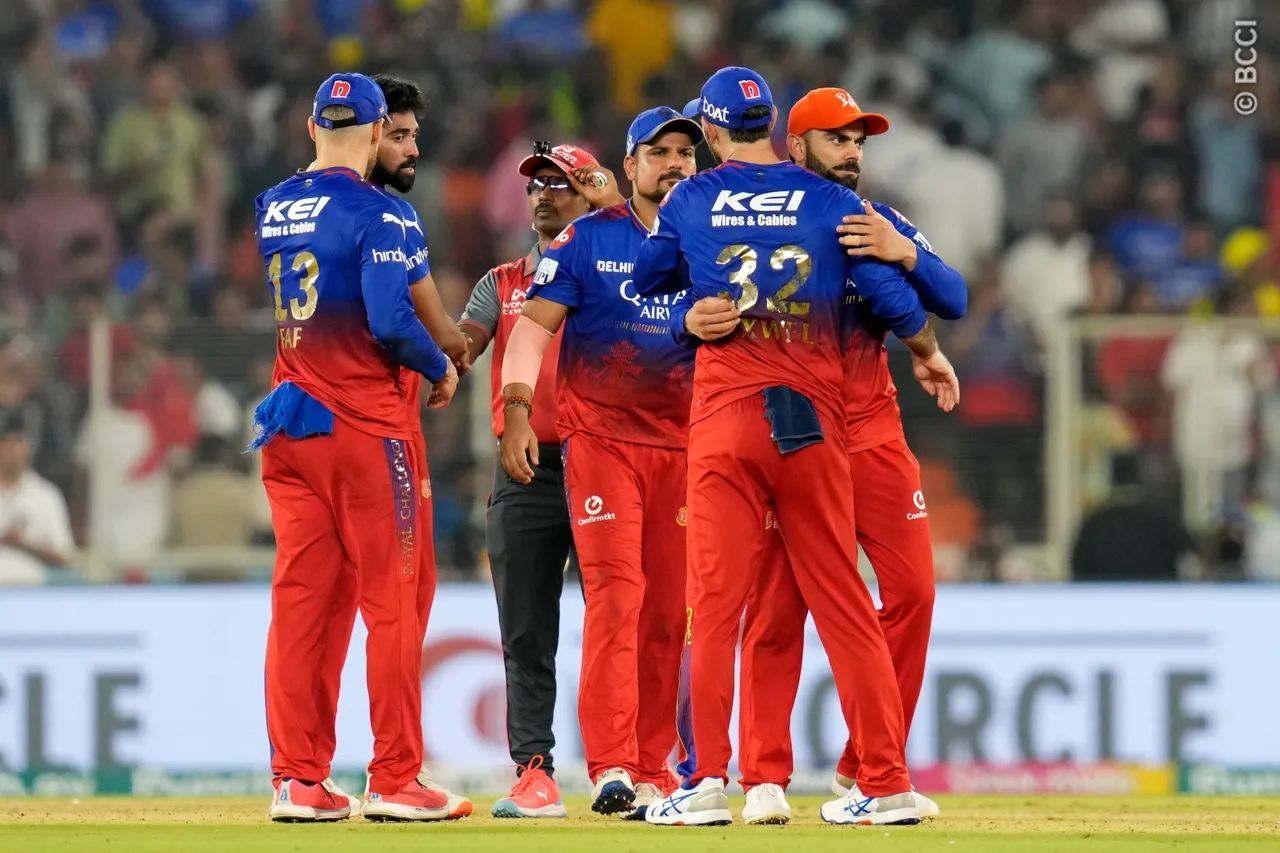
Almost but not quite: Another RCB tale of hope and heartbreak
The Royal Challengers Bengaluru (RCB) have been the talk of the town in recent weeks. At the end of April, they were staring down the barrel (and elimination), having lost seven out of their first eight matches. Then came the turnaround that left everyone stunned, and they clinched an unlikely playoff berth last Saturday, outlasting defending champions Chennai Super Kings.
Expectations, thus, were sky-high as RCB prepared to clash swords with the Rajasthan Royals. More so because the Royals, in contrast to Faf du Plessis’ men, were in the midst of a winless run, which dated back to April 27.
Indian cricket legend Sunil Gavaskar even went as far as quipping that RCB would walk all over the Royals. But through the course of four hours of T20 cricket in Ahmedabad, everything RCB fans were fearing and dreading, came to the fore.
RCB could not find the right tempo with the bat
Inserted into bat, they got off to a solid, if not spectacular start. Trent Boult kept things quiet and used the conditions to his advantage. Virat Kohli showed intent but du Plessis really struggled at the other end. As a partnership, they could not get enough in the powerplay and that possibly led to the slowdown later (more on that in a bit).
Once du Plessis was dismissed, RCB opted to send in Cameron Green, which in the circumstances, was a surprising call. Not because Green has been out of form, but because Rajat Patidar has been batting like a dream, especially against the spinners.
The Royals, more often than not, bowl eight overs of spin, which starts immediately after the powerplay ends. So, having Patidar coming in, after 4.4 overs were bowled and du Plessis was dismissed, was probably the right decision.
That was not the only tactical bit they got wrong.
Later in the innings, they decided to bring in left-arm spinner Swapnil Singh, who has normally been their Impact Player. Apart from his bowling, he was also rushed in to ensure RCB made the most of the last two overs. Had they not done so, they could have brought in Vijaykumar Vyshak, who has shown off his boundary-hitting in domestic cricket and would have been more useful at a venue where dew was prevalent.
It did not help that Yashasvi Jaiswal – a left-hander - batted till well after the powerplay, and made Swapnil almost redundant. Irrespective, Vyshak seemed the better percentage move.
Coming back to their batting, they were also content to sit on Ravichandran Ashwin. The veteran, undeniably, bowled beautifully but RCB might have been better served trying to put him off his lines and lengths. They got too bogged down and when they tried to break the shackles, they lost wickets in clumps, captured perfectly by Ashwin’s double-wicket fourth over.
Individually too, they fell short. Dinesh Karthik, in his final IPL appearance, just could not come to grips with the pressure and the situation. Du Plessis and Kohli’s strike rate hovered under 140. Glenn Maxwell’s shot selection also left a bit to be desired.
A combination of these things meant that they missed out on those extra 15-20 runs, which, through this upturn, has given their inexperienced bowlers the cushion they require. The sustained hitting that ensured momentum was not lost at any point, even if wickets fell, also went missing, just when they needed it most.
Through the middle overs, they tried. Too injudiciously, some would say, especially in Maxwell’s case. But they just could not make it work. If that was down to the occasion, the pitch or the Royals’ splendid defensive bowling, will only be answered once further dust has settled.
They were then left playing catch-up with the ball and on a surface that was sliding on better than it did in the first innings, the Royals seized the initiative – something RCB were guilty of not doing enough. Not for the first time in a high-pressure game either.
Another aspect, which is anyway highly debatable, is the mental aspect. The victory against CSK was treated as a crescendo, as was qualifying for the playoffs, which to be fair to them, made sense given where they were after eight league matches.
The problem with thinking the tip of the peak has been scaled, though, is that it then leaves you exposed and vulnerable to the fall. And from that height, that fall usually becomes excruciating.
Of course, we will never know if this was indeed a factor, until long after this season has wound up. What sticks out now, definitively, is RCB’s failure to win a must-win playoff fixture, and a game that would have taken them closer to promised land and the match that matters.
They can still be proud of this season and as Karthik mentioned a few days ago, there will be people who will look at this side and talk about how they made the playoffs from the brink of elimination.
Sporting memories, however, are fickle and they usually only glorify the team that stands atop the pile after it all finishes, rightly or wrongly. That is not putting any blame on them or belittling their achievement. It is just how it is.
And it is a reality RCB have to make do with for another season, at least. Far away from the fantasy ending they thought they were within touching distance of.